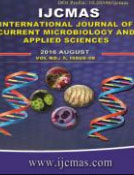


 National Academy of Agricultural Sciences (NAAS)
National Academy of Agricultural Sciences (NAAS)

|
PRINT ISSN : 2319-7692
Online ISSN : 2319-7706 Issues : 12 per year Publisher : Excellent Publishers Email : editorijcmas@gmail.com / submit@ijcmas.com Editor-in-chief: Dr.M.Prakash Index Copernicus ICV 2018: 95.39 NAAS RATING 2020: 5.38 |
Soil degradation as a result of improper land use and management practices has limited the ability of the soil to produce optimally. Therefore, this study was aimed atassessing the effects of cow dung manure amendment on some properties of a degraded soil located within the Teaching and Research Farm, Ladoke Akintola University of Technology, Ogbomoso, Nigeria and the influence on the growth of egg plant (Solanum melongena). Soil samples were collected from 0-30 cm layer of the soil and were packed in pots. The soil samples in the pots were treated with 0, 10, 15 and 20 ton/ha of cow dung designated as control, T1, T2 and T3, respectively in 3 replications. At harvest, soil samples were collected at 0-10 and 10-20 cm depth in the pots for the analysis of physico-chemical properties. Plant growth parameters were monitored from five weeks after transplanting till harvest. The results revealed that at both depths (0-10 and 10-20 cm), there was significant (p<0.05) decrease in soil bulk density (BD), and corresponding increase in total porosity (Pt) and mean weight diameter (MWD). Soil pH, OC, TN and P significantly (p<0.05) increased while the C:N ratio was decreased with application of cow dung. Plant height and number of leaves were significantly (p<0.05) higher in soils amended with cow dung, with treatment T3 (20 ton/ha) giving the best results. The results showed that cow dung has great potentials for amelioration of degraded soils however further studies are required to establish optimum rate for sustainable crop production. Also the increase in P loading with increasing application rates also call for further investigation in terms of negative impact on the environment.
 |
 |
 |
 |
 |